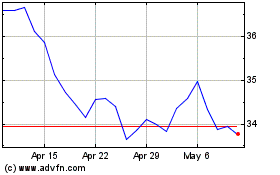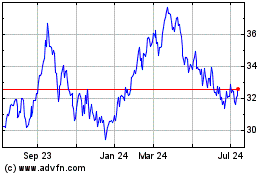Car Makers Pledge to Make Automatic Brakes Standard by 2022
March 16 2016 - 1:10PM
Dow Jones News
Nearly all auto makers have pledged to make automatic emergency
brakes standard on vehicles within six years, said people familiar
with the matter, adding to safety breakthroughs such as air bags
that have become mainstays on cars and trucks.
Auto makers representing 99% of U.S. light-vehicle sales will
pledge to car-safety regulators and the nonprofit Insurance
Institute for Highway Safety on Thursday that the technology will
be on nearly all their cars and trucks by September 2022, the
people said.
General Motors Co., Ford Motor Co., Fiat Chrysler Automobiles
NV, Toyota Motor Corp., Honda Motor Co. and Volkswagen AG are among
the car makers making the pledge, the person said. Others doing so
include luxury car manufacturers BMW AG, Daimler AG's Mercedes-Benz
and Volkswagen's Audi, the person said.
Reuters earlier reported on the agreement.
The pledge, expected to be unveiled at a news conference
Thursday in McLean, Va., with auto makers, the National Highway
Traffic Safety Administration and insurance institute, follows an
initial promise from some car companies in September to eventually
make the braking technology standard.
Automatic emergency-braking systems use vehicle sensors
including cameras, radars and lasers to detect imminent crashes.
The systems then war motorists before engaging brakes automatically
if the driver doesn't react quickly enough.
Regulators have been pushing car makers to put the technology on
more vehicles to help cut down on traffic fatalities. Other
automated technologies popping up on vehicles include
lane-departure warnings, collision warnings and systems designed to
steer cars back when they veer out of lanes on roadways.
The technologies are harbingers of fully driverless cars.
Executives from Alphabet Inc.'s Google, GM, ride-sharing company
Lyft Inc. and supplier Delphi Automotive testified before a Senate
panel Tuesday on developing regulations for automated vehicles.
By the end of the year, regulators plan to revamp a star-rated
safety system that will prevent auto makers from getting top
scores if a vehicle doesn't feature a trove of advanced safety
features, a move that could prompt many car makers to install
automatic brakes well before 2022. The feature isn't yet widespread
on new vehicles sold in the U.S.
Some safety advocates have criticized regulators for engaging in
what are essentially voluntary agreements with auto makers that
don't feature severe penalties if they fail to comply. But
regulators believe revamping existing safety rules could prove time
consuming and delay more widespread adoption of many features. The
revamped star-rated safety system, meanwhile, is intended to spur
auto makers to install features quickly lest they lose coveted
ratings that consumers weigh when shopping for a new ride.
Many of these safety features tend to be on more expensive
models but they are starting to crop up on cheaper vehicles. The
latest entry-level Honda Civic running around $20,000, for
instance, now makes available features including lane keeping
assist, adaptive cruise control that changes speeds based on
traffic patterns and automatic brakes.
Write to Mike Spector at mike.spector@wsj.com
(END) Dow Jones Newswires
March 16, 2016 12:55 ET (16:55 GMT)
Copyright (c) 2016 Dow Jones & Company, Inc.
Honda Motor (NYSE:HMC)
Historical Stock Chart
From Mar 2024 to Apr 2024

Honda Motor (NYSE:HMC)
Historical Stock Chart
From Apr 2023 to Apr 2024
